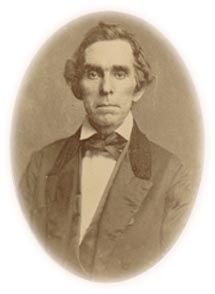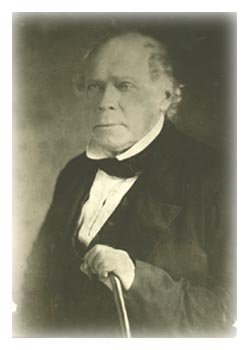| |
Austin College
Presidents
From the beginning to the
relocation |
| |
|
| |
Reverend
Samuel McKinney 1850-1853 &
1862-1871
|
 |
| |
Rev. Samuel McKinney (1807-1879) was born in
County Antrim, Ireland, and immigrated to Philadelphia with his family in 1812. After
growing up in Tennessee, he graduated from the University of Pennsylvania in 1832.
Originally a student of medicine, McKinney decided to change his major to theology and
become a preacher. After serving as a missionary in the "backwoods" of Illinois
and teaching in Tennessee, he became President of Chalrners Institute in Holly Springs,
Mississippi. At the request of Rev. Daniel Baker, McKinney came to Huntsville, Texas, and
assumed the presidency of Austin College in 1850. In addition to his administrative duty,
McKinney had charge of the Classical Department and supervision of the English Department
of the preparatory school for an annual salary of $1500. During his presidency, he also
acted as pastor of the Presbyterian Church in Huntsville. McKinney presided over the
erection of the first permanent Austin College building. He served until a personal
dispute with Sam Houston prompted his resignation on June 29, 1853. He returned to
Mississippi, but was called again to serve as the College's president through the
difficult years of the Civil War and early Reconstruction, 1862-1871. |
| |
|
| |
 |
Reverend
Daniel Baker
1853-1857
|
| |
Daniel Baker, founder and second president of Austin College,
was born in Midway, Georgia, August 17, 1791. His early education was self-taught. Baker
attended Hampden-Sydney for two years before graduating with honors from Princeton in
1815. After serving pastorates along the eastern seaboard, he turned to missionary work
and came to Texas for the first time from Alabama in 1840. In 1849, he returned to Texas
as a missionary, determined to establish a college on the frontier. Dr. Baker devoted
himself to the duties of financial agent of the College, education lobbyist to the
Legislature, and itinerant preacher. He reluctantly stepped into the presidency of Austin
College with the resignation of Samuel McKinney in 1853 and served until 1857. During this
period his continued efforts on behalf of public education in the Texas Legislature
contributed to the eventual passage of public school legislation. Baker resigned the
presidency of Austin College in January, 1857, in order to devote all his time and
energies to fundraising for the College and died in Austin on December 10, 1857, while
trying to obtain aid for the College from the Texas legislature. |
| |
|
| |
Rufus
William Bailey 1858-1862
|
 |
| |
Rufus Bailey was born in Yarmouth, Maine, April 13, 1793. He
was educated at Dartmouth, receiving his Masters Degree in 1816. Subsequently, he studied
law with Daniel Webster, before changing directions and entering Andover Theological
Seminary. He entered the ministry in 1818 as pastor of a Congregational Church in
Connecticut and at the same time held the post of Professor of Moral Philosophy (history)
in the local military academy. Bailey maintained an active interest in higher education,
serving as trustee of Williams College in Massachusetts and the University of Vermont. It
appears Bailey felt a commitment to the education of women as well as men. Before reaching
Texas in 1854, he organized the Pittsfield Female Seminary, established the Richland
Normal School in South Carolina, taught at a female school in Fayetteville, North
Carolina, and founded Augusta Female Academy (now Mary Baldwin College) in Staunton,
Virginia. He emigrated to Texas for health reasons and was appointed Professor of
Languages at Austin College in Huntsville, Texas, in 1855. In 1858, the Board of Trustees
elected him to the presidency of Austin College. Bailey assumed the presidency on the
heels of an administrative debacle in June of 1858 that produced a revolt of the faculty
and a resulting failure of the college to open the fall semester of that year. In the
tradition of Daniel Baker and Samuel McKinney before him, he also served as pastor of
Huntsville Presbyterian Church, where his keen mind and ready wit earned him the nickname
the "Walking Library" among his congregation. Bailey tendered his resignation as
president of the College in 1860, pleading ill health, but in the face of the unsettling
events of that year agreed to serve until a replacement could be found. As a result,
Bailey's actual departure did not occur until 1862. He died in Huntsville on April 23,
1863, only three months and three days prior to the death of the College's most famous and
colorful trustee, Sam Houston, who died in the house Bailey himself had built. |
| |
|
| |
index |
next
 |


